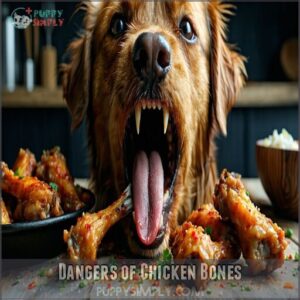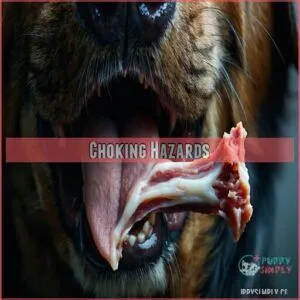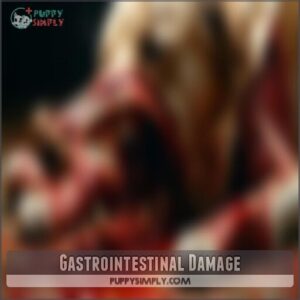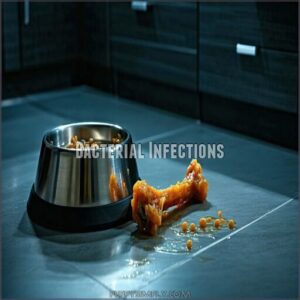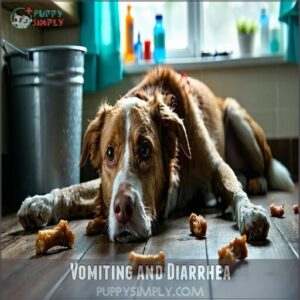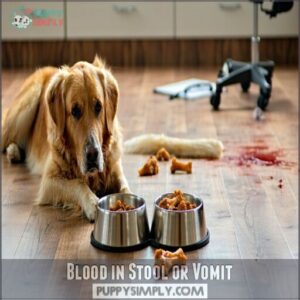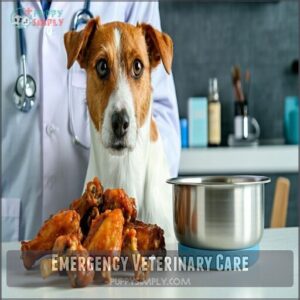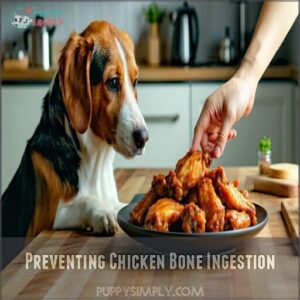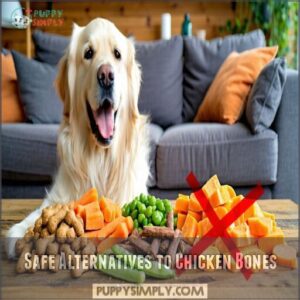This site is supported by our readers. We may earn a commission, at no cost to you, if you purchase through links.
 No, dogs shouldn’t eat chicken wing bones.
No, dogs shouldn’t eat chicken wing bones.
These bones are brittle and can easily splinter, turning into sharp pieces that might choke your dog or tear through their throat, stomach, or intestines. It’s like handing them a ticking time bomb for their digestive system.
Even raw chicken bones, though less likely to splinter, still pose risks like blockages or bacterial infections. If your pup accidentally swallows one, watch for signs like vomiting, lethargy, or blood in their stool and contact your vet immediately.
Instead, stick to safe alternatives like chew toys or vet-approved treats to keep them happy and healthy, and always prioritize their well-being to avoid a potential digestive system issue.
Table Of Contents
- Key Takeaways
- Dangers of Chicken Bones
- Can Dogs Eat Chicken Wings Bones
- Risks of Chicken Wing Bones
- Signs of Chicken Bone Ingestion
- Emergency Veterinary Care
- Preventing Chicken Bone Ingestion
- Safe Alternatives to Chicken Bones
- Frequently Asked Questions (FAQs)
- Can I give my dog cooked chicken wing bones?
- Will my dog be ok after eating a chicken wing?
- Is it safe for dogs to eat chicken wings or drumsticks?
- Are cooked chicken wings ok for dogs?
- How much chicken wing bone is dangerous for dogs?
- What is the difference between chicken wing bones and other poultry bones?
- What should I do if my dog eats one?
- Are chicken bones more dangerous than turkey bones?
- How long does it take for symptoms to appear?
- Do raw chicken wings carry the same risks?
- Conclusion
Key Takeaways
- Don’t feed your dog chicken wing bones – they splinter easily and can cause choking, throat tears, stomach punctures, and intestinal damage.
- Watch for warning signs if your dog accidentally eats chicken bones – vomiting, diarrhea, lethargy, loss of appetite, or blood in stool require immediate veterinary attention.
- Prevent accidents by securing trash cans, storing food out of reach, training your dog with "leave it" commands, and supervising them during mealtimes.
- Offer safe alternatives instead of chicken bones – healthy treats like carrot sticks, sweet potato slices, green beans, or boneless cooked chicken provide enjoyment without the risks.
Dangers of Chicken Bones
You won’t believe how dangerous chicken bones can be for your furry friend, as they easily splinter and can tear your dog’s throat or puncture their intestines.
These brittle hazards can cause choking, internal bleeding, or blockages that might require emergency surgery, so it’s never worth the risk.
Internal Bleeding Risks
Many dogs suffer internal bleeding when chicken wing bones splinter inside their digestive tract.
These sharp fragments can pierce through the stomach or intestinal walls, causing potentially life-threatening hemorrhaging.
- Blood in stool often indicates intestinal puncture from bone fragments
- Anemia symptoms like pale gums and weakness may develop as bleeding continues
- Internal organ damage can occur when bone fragments migrate through tissues
- Severity of bleeding determines whether emergency surgery is needed
The presence of these symptoms can indicate that a dog has suffered from bone fragments, highlighting the importance of monitoring for signs of intestinal puncture.
Intestinal Obstruction
While internal bleeding is certainly dangerous, intestinal obstruction is another serious threat when your dog swallowed chicken bone.
Chicken wing bones can lodge in your dog’s gastrointestinal tract, blocking the normal flow of food and waste.
The severity factors depend on obstruction location—partial obstructions might pass naturally, but complete blockages often require surgical options and careful post-op care.
Don’t wait for symptoms to worsen before seeking veterinary attention.
Esophageal Perforation
While intestinal blockages are serious, esophageal perforation represents an immediate life-threatening emergency.
When your dog swallows a chicken wing bone, it can scratch or tear the esophagus on its way down. These esophageal tears allow food, water, and bacteria to leak into the chest cavity, causing severe infections.
Surgical repair is often necessary, followed by careful post-op care and dietary changes. Internal bleeding is also a significant risk.
If your dog’s breathing seems labored after eating bones, contact an emergency vet immediately, as this can be a sign of a life-threatening situation that requires immediate attention.
Can Dogs Eat Chicken Wings Bones
Now that you understand the dangers, let’s answer the burning question: Can dogs eat chicken wings bones? The answer is a resounding NO. Your dog’s digestive system simply isn’t designed to handle chicken wing bones safely.
Chicken bones for dogs, especially cooked ones, pose serious threats when they splinter. Bone splintering explained simply: when chewed, these brittle structures break into sharp fragments that can harm your pet internally.
Here’s why you should keep chicken wing bones away from your dog:
- One vet visit for bone-related injuries can lead to veterinary costs exceeding $1,000
- Your dog’s pleading eyes aren’t worth the risk of a painful emergency
- That moment of "treat sharing" could mean days of worry and suffering
- The guilt you’ll feel if something goes wrong is overwhelming
Instead, look into safe chicken alternatives that satisfy your pup’s cravings without the danger.
Risks of Chicken Wing Bones
Feeding chicken wing bones to your dog can lead to serious health risks. These bones can splinter, causing choking, internal injuries, or dangerous infections.
Chicken wing bones can splinter, leading to choking, internal injuries, and life-threatening infections—don’t risk your dog’s health with these dangers.
Choking Hazards
Chicken wing bones pose a serious choking hazard for dogs.
Their small size and brittle nature can cause airway obstruction if swallowed.
Watch for choking symptoms like gasping, gagging, or pawing at the mouth.
Immediate steps, like the Heimlich Maneuver or careful bone removal (if visible), can save your dog.
Preventing choking starts with keeping bones out of reach, and being aware of the potential dangers, such as choking, can help you take proactive measures to protect your pet.
Gastrointestinal Damage
Esophageal tears, GI perforation, and intestinal blockage are serious dangers when dogs eat chicken wing bones.
These splinters can shred your dog’s digestive tract, causing:
- Internal bleeding, which shows up as vomiting or bloody diarrhea.
- Gastroenteritis, leading to severe pain and discomfort.
- Intestinal obstruction, blocking digestion completely.
Even small bones can turn a snack into a life-threatening situation.
Bacterial Infections
Eating raw or undercooked chicken wing bones exposes dogs to harmful bacteria like salmonella and E. coli.
These pathogens can cause severe bacterial infections, leading to symptoms like vomiting, diarrhea, and lethargy. Infection symptoms may require antibiotic treatment.
To prevent disease, always keep chicken bones and contaminated meat out of reach. Prioritize safety by avoiding risky foods entirely.
Signs of Chicken Bone Ingestion
If your dog eats a chicken wing bone, you’ll need to watch for telltale signs that something’s wrong.
Vomiting, diarrhea, or unusual behavior like lethargy can signal a problem that needs attention.
Vomiting and Diarrhea
Vomiting and diarrhea after eating chicken bones can hint at a problem like gastroenteritis or an intestinal blockage.
Keep an eye on symptom duration—if it lasts over 24 hours or worsens, consult a vet. Dehydration concerns are common, so make certain of hydration.
Dietary changes, like offering plain rice, may help. Know when to worry; persistent symptoms require immediate treatment options.
These symptoms could also indicate internal bleeding risks and may signify a need for urgent veterinary care to address potential internal bleeding.
Lethargy and Loss of Appetite
Lethargy and appetite loss might signal gastrointestinal issues from chicken bones.
If your dog seems unusually tired, disinterested in food, or shows pain indicators, act fast. These can point to internal trouble needing diagnostic testing.
Keep an eye on dehydration signs too. Call a veterinarian immediately—early treatment options improve recovery timelines and protect your dog’s health.
Always prioritize safety!
Blood in Stool or Vomit
Noticing blood in stool or vomit after a dog eats chicken bones can feel like finding an unwelcome surprise. It’s a red flag.
- Monitor for persistent vomiting.
- Check stool for blood.
- Watch for lack of appetite or energy.
- Contact a veterinarian for emergency diagnostic testing.
- Discuss treatment options and recovery timelines promptly to protect your dog’s health.
Emergency Veterinary Care
If your dog has eaten chicken bones, it’s vital to act quickly and contact a veterinarian.
Prompt professional care can prevent serious issues like choking, internal bleeding, or an intestinal blockage.
Choking Emergencies
Dog choking is terrifying but handle it calmly. Look for pawing at the mouth or gasping—signs of airway blockage.
Start emergency care with the Heimlich Maneuver if breathing stops. For severe choking, CPR for dogs may be necessary.
Veterinary intervention is vital if you can’t remove the object. Post-choking care guarantees recovery and avoids future emergencies. Always act fast.
Severe Constipation
Severe constipation after eating chicken bones isn’t just uncomfortable—it’s dangerous.
Blockages from bone fragments can lead to pain and further complications. Watch for dry stools or straining.
- Causes of Constipation: Bone fragments and dehydration risks.
- Veterinary Intervention: Needed for ongoing blockages or bone-related dog constipation.
- Dietary Adjustments: Soft, bland foods help.
- Chronic Issues: Monitor stool habits closely.
Internal Bleeding
If your dog ate a chicken wing bone, internal bleeding is a serious risk.
Watch for vomiting blood, bloody stool, or signs of anemia like weakness.
This dog emergency can result from punctured organs or blood clotting issues.
A veterinary diagnosis is essential to assess organ damage.
Treatment options may include surgery or supportive care, depending on the chicken wing bone hazard.
Preventing Chicken Bone Ingestion
You can prevent your dog from eating chicken bones by keeping food and trash out of reach and supervising them during meals.
Training your dog to follow commands like “leave it” is also essential for their safety.
Securing Trash and Food
Keep trash can security in mind by using petproofing lids or storing bins in locked areas.
Prevent counter surfing by keeping food out of reach and using food storage solutions like sealed containers.
Educate guests on avoiding food stealing behavior by keeping plates guarded, and dispose of leftovers in outdoor garbage cans to avoid accidental ingestion risks.
Consider using specialized trash receptacles for added safety and to prevent accidental ingestion.
Training Dogs to Avoid Bones
A well-trained dog is less likely to snag harmful bones.
Use positive reinforcement to teach a "Drop It" command, making bone retrieval safer.
Address counter surfing by keeping food out of reach and practicing consistent commands.
Replace temptations with bone alternatives or safe chews, ensuring your dog stays engaged.
Training builds trust and prevents accidents—worth every effort!
Consider exploring training product options to enhance your training methods.
Supervising Mealtime
During mealtime, create a calm environment by keeping chicken wings or bones far from curious noses.
Practice safe food handling and supervise dogs closely to prevent accidents. Watch dog behavior during meals and remind guests to avoid slipping scraps.
Use training strategies like “leave it” commands. Cooked bones splinter easily, posing a risk of internal injury.
If choking occurs, contact a veterinarian immediately. Supervision keeps dangers at bay.
Safe Alternatives to Chicken Bones
You want to keep your dog safe, so it’s important to give them treats that won’t harm them.
Fortunately, there are plenty of healthy and safe alternatives to chicken bones that your dog will love.
Healthy Treat Options
Skip the worry of chicken wing bone toxicity by offering safe, tasty treats.
You can try Rawhide Chews or swap them for Sweet Potato slices.
Carrot Sticks and Green Beans are crunchy and nutritious, while a dollop of Peanut Butter keeps tails wagging.
Let’s avoid the risks of dogs eating chicken bones by sticking to these wholesome alternatives dogs adore!
Many dog owners rely on rawhide chew options to keep their pets happy and healthy.
Sticking to wholesome alternatives is a great way to ensure your dog’s well-being.
Safe Foods for Dogs
In regards to dog nutrition, stick to safe and simple options.
Cooked chicken bones and chicken wings are dangerous for dogs due to splintering.
Instead, healthy snacks like carrots, apples (no seeds), or plain cooked chicken (boneless) are safe.
Pet safety means avoiding foods that spark food allergies.
A balanced canine diet means your dog thrives.
Understanding the bone related risks is vital for dog owners to prevent accidents.
Avoiding Toxic Substances
It’s essential to know which foods are toxic to dogs.
Protect your pet’s safety by avoiding these hazardous items:
- Chocolate and caffeine – Harmful to your dog’s heart and nerves.
- Grapes and raisins – Can cause kidney failure.
- Onions and garlic – Damage red blood cells.
- Xylitol – Found in gum, it leads to low blood sugar.
Stay vigilant for dog wellness!
Frequently Asked Questions (FAQs)
Can I give my dog cooked chicken wing bones?
Better safe than sorry" applies here—don’t give your dog cooked chicken wing bones.
They splinter easily, causing choking, injuries, or blockages.
Stick to safer treats to avoid vet visits and keep your pup healthy.
Will my dog be ok after eating a chicken wing?
If your dog eats a chicken wing, watch closely for choking, vomiting, or pain.
Cooked bones can splinter and cause harm.
Contact your vet if symptoms appear or to rule out internal injuries, this includes watching for choking.
Is it safe for dogs to eat chicken wings or drumsticks?
It’s not safe to give dogs chicken wing or drumstick bones.
They splinter easily, causing choking, internal injuries, or blockages.
Stick to plain, boneless chicken meat instead, and keep cooked bones far out of reach.
Are cooked chicken wings ok for dogs?
Giving cooked chicken wing bones to your dog is like handing them a ticking time bomb.
They splinter easily, risking choking, internal injuries, or blockages.
Always avoid cooked bones and stick to safe alternatives.
How much chicken wing bone is dangerous for dogs?
Any amount of chicken wing bone can be dangerous for dogs.
Even small pieces might splinter, causing choking, internal injuries, or blockages.
Always keep bones out of reach and monitor closely if ingestion occurs.
What is the difference between chicken wing bones and other poultry bones?
Picture a fragile twig snapping underfoot—chicken wing bones splinter just as easily, posing a higher risk.
Compared to sturdier poultry bones, their thin, sharp fragments can cause choking, internal injuries, or blockages in your dog’s digestive tract, which is a significant concern due to the higher risk.
What should I do if my dog eats one?
If your dog eats a chicken wing bone, stay calm.
Monitor for choking, vomiting, or signs of distress.
Avoid inducing vomiting.
Offer soft food to cushion sharp edges and call your vet for guidance immediately.
Are chicken bones more dangerous than turkey bones?
About 70% of chicken bones splinter easily, making them more dangerous than turkey bones.
Turkey bones are thicker but still risky. Both can cause choking, internal injuries, or obstructions.
Keep all poultry bones away from dogs.
How long does it take for symptoms to appear?
Symptoms can show up within a few hours but might take up to 72 hours.
Signs like vomiting, gagging, or lethargy often appear quickly, while blockages or perforations can take longer to become obvious, showing complete concepts of the disease progression.
Do raw chicken wings carry the same risks?
Raw chicken wings can be risky because they may still splinter and cause choking, internal injuries, or blockages.
They can also carry harmful bacteria like Salmonella, putting your dog at risk of infection or illness.
Conclusion
Remember, the million-dollar question "can dogs eat chicken wings bones" has a simple answer – absolutely not!
Keep those dangerous bones far away from your furry friend.
Instead, offer safe, dog-approved treats that won’t send you rushing to the emergency vet.
By properly disposing of chicken bones, supervising your dog during meals, and choosing appropriate alternatives, you’re protecting your beloved companion from unnecessary suffering.
Your dog’s safety is worth every precaution you take – they’re counting on you!

